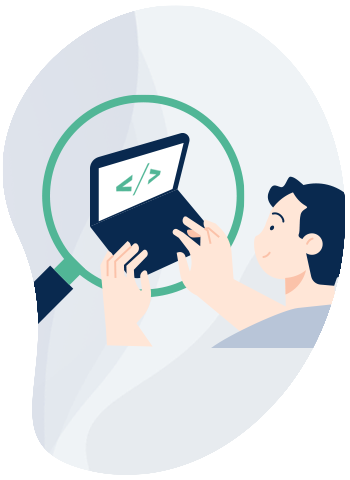In Poland, the IT market is still very dynamic. After noting a decline in recruitment of IT experts in the second half of 2022, demand for specialists has begun to rebound, which mainly concerns Business Intelligence, Big Data and Data Science. The issue of salaries is also on the rise – in almost 70% of cases by more than 10%, and in the case of Big Data Developers by up to 40%, according to the “IT Salaries and Trends Report.” The peculiarities of the industry and the demand in the labor market mean that recruitment in IT is governed by its own rules.
A tailor-made recruitment process
The ideal recruitment process is “tailored” to the needs of the organization that has decided to look for an employee. Working in the IT industry involves, among other things. with knowledge of programming languages, solution testing methods or familiarity with specific systems that are used in a particular company or project. Therefore, the main objective of any recruitment process is: to identify and verify the level of necessary skills, which directly derive from the responsibilities of the position.
In addition, the candidate’s “soft” competencies are verified during the recruitment process. Among them, communication and solution-creating skills lead the way, but it doesn’t stop there. Software development involves a specific work methodology, so it is important to verify that the candidate will find himself, for example: in an agile Scrum team and that he will “prove the solution on time.”
First – a conversation with the recruiter
The initial stages of the recruitment process boil down to the selection of resumes – this is where the candidate’s technologies are identified and the candidate has used and completed previous projects. This is also a good time to analyze the tools he has been working on. In addition, from screening resumes also emerges a picture of the career path the candidate has taken.
The next step in the process is an interview with a recruiter. It usually lasts about 30 to 45 minutes and is conducted by telephone or video conference. During the interview, the recruiter examines the candidate’s motivation as to why he or she should work for the company. He then inquires in more detail about the technologies and tools the candidate has worked with, for example, there will be task tracing tools, variously messengers, repositories, monitoring and automation or application building programs. He then inquires about the team’s methodology and the candidate’s role in the project team.
Language skills are also verified at this stage. Nowadays, language tests are used less and less, with a focus on verbal communication. So at the interview, expect some questions asked in a foreign language. Next, the recruiter identifies soft skills like communication, openness to change, teamwork and analytical skills.
The nature of the IT industry forces specialists to develop continuously, so the recruiter identifies the candidate’s chosen path of development, then verifies it with opportunities for promotion in a specific organization. The final element of the recruitment interview is to gather information on the candidate’s availability to start working for the organization, financial expectations, form of employment or working model and hours.
An interview with a recruiter is a good time to talk about everyday life. It’s worth asking about potential assignments, information about the team or benefits the company shares with employees.
Second – time for technical verification
The technical interview is often the most stressful stage of the entire recruitment process. It is conducted in the form of an online chat on a webcam by an experienced specialist, and usually lasts up to two hours. During this stage, knowledge and skills in the technologies used in the company or position are verified. Specific tasks often await the candidate, in which it is necessary to demonstrate not only knowledge of programming languages, algorithms, but also analysis of the problem and creation of solutions.
Livecoding
An increasingly popular form of technical verification of programmers is livecoding. In remote recruitment, such activities are carried out through platforms designed for this purpose, hence you do not always have to appear for an interview in person. During livecoding, the candidate simultaneously programs and tells why he or she chooses a particular solution. During this stage, the train of thought, precision of expression and the final result are verified.
For junior positions, technical verification looks different, usually in the form of tests. This is an easier option to carry out, and in practice means less stress for the candidate. In addition, its results are generated virtually immediately. After logging on to the platform, we have a certain amount of time to complete the knowledge test, and to do so, you can connect from any part of the world.
After the technical interview, feedback is provided on the results that the candidate obtained during this stage.
Third – coffee with the supervisor and the team
The final stage of the process is a meeting with the future supervisor. During this conversation, the manager talks about his vision and expectations for the tasks to be carried out in the future. He questions the candidate about what he knows about the company and his motivation for the position. Searches for all the added value that a hired person would bring to the team.
In addition, it is not uncommon for the supervisor to arrange a meeting with your future team to, see how the candidate will fit in with his future team. In such a situation, it is also the team that has the opportunity to get to know the potential employee better, and the latter to allay his or her fears about future colleagues and the prevailing atmosphere in the group. This is a good time to discuss what the implementation process looks like for a new member of the organization and what actions, on the part of the supervisor or team, can be expected.
No company without people – a good atmosphere is paramount
The goal of the recruitment process is first and foremost to fill the vacancy at the optimal time. Here, people come first, and this makes it paramount during recruitment to create the right atmosphere – full of trust and a sense of security. As a result, both sides of the process are able to honestly communicate their needs and expectations.
An ideal match between the candidate and the organization contributes to the employee’s sense of satisfaction with his or her activities, and therefore to increased motivation to work.

